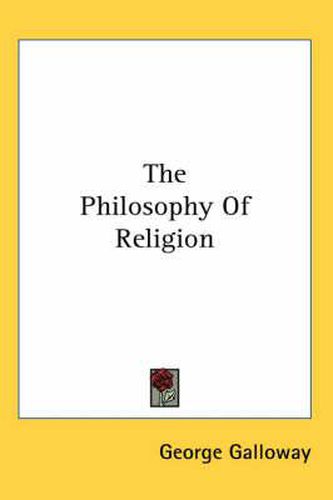Readings Newsletter
Become a Readings Member to make your shopping experience even easier.
Sign in or sign up for free!
You’re not far away from qualifying for FREE standard shipping within Australia
You’ve qualified for FREE standard shipping within Australia
The cart is loading…






Purchase of this book includes free trial access to www.million-books.com where you can read more than a million books for free. This is an OCR edition with typos. Excerpt from book: PART L THE NATURE AND DEVELOPMENT OF RELIGION (PHENOMENOLOGICAL). CHAPTER L THE PSYCHICAL BASIS OF RELIGION. A.?The Psychical Nature Of Man. Ip asked what the nature of religion is, the ordinary person might have little difficulty in furnishing an answer. He will single out some feature which strikes him as characteristic of piety; and if he has little or no knowledge of religions other than his own, he will have the less hesitation in returning a reply. To one who has some acquaintance with the varied phenomena and the diverse forms of religion, the problem does not seem so easily solved. He asks: Where does religion begin, and how are you to distinguish it from mere superstition ? What test are you to apply in order to determine the presence of religion ? and is it possible to define certain points which are common to every form of religion ? What, for instance, is the common denominator of Buddhism and Eoman Catholicism, or of devil-worship and the Keligion of Humanity ? There seems here to be little or no similarity, whether we regard the temper of the worship or the objects worshipped. In this perplexity he will probably be led to the conclusion that he cannot discover any bard and fast test which can be used as a standard of what is religious and what is not. He will also recognise that it would be arbitrary to make his own feelings and judgment the criterion in this matter.With the best will in the world, no man is able to divest himself entirely of prejudice and personal bias. But what the student of religion may fairly do is this: he can take the religious consciousness of the society in which he lives and which he shares, and he can properly assume that there is a continuity between it and earlier stages of religious development For continuity is involved i…
$9.00 standard shipping within Australia
FREE standard shipping within Australia for orders over $100.00
Express & International shipping calculated at checkout
Purchase of this book includes free trial access to www.million-books.com where you can read more than a million books for free. This is an OCR edition with typos. Excerpt from book: PART L THE NATURE AND DEVELOPMENT OF RELIGION (PHENOMENOLOGICAL). CHAPTER L THE PSYCHICAL BASIS OF RELIGION. A.?The Psychical Nature Of Man. Ip asked what the nature of religion is, the ordinary person might have little difficulty in furnishing an answer. He will single out some feature which strikes him as characteristic of piety; and if he has little or no knowledge of religions other than his own, he will have the less hesitation in returning a reply. To one who has some acquaintance with the varied phenomena and the diverse forms of religion, the problem does not seem so easily solved. He asks: Where does religion begin, and how are you to distinguish it from mere superstition ? What test are you to apply in order to determine the presence of religion ? and is it possible to define certain points which are common to every form of religion ? What, for instance, is the common denominator of Buddhism and Eoman Catholicism, or of devil-worship and the Keligion of Humanity ? There seems here to be little or no similarity, whether we regard the temper of the worship or the objects worshipped. In this perplexity he will probably be led to the conclusion that he cannot discover any bard and fast test which can be used as a standard of what is religious and what is not. He will also recognise that it would be arbitrary to make his own feelings and judgment the criterion in this matter.With the best will in the world, no man is able to divest himself entirely of prejudice and personal bias. But what the student of religion may fairly do is this: he can take the religious consciousness of the society in which he lives and which he shares, and he can properly assume that there is a continuity between it and earlier stages of religious development For continuity is involved i…